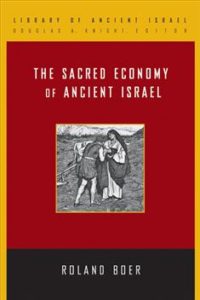Um elogiado estudo sobre a economia do antigo Israel. Parece ser algo denso e sólido. E que deve ir muito além dos costumeiros estudos na área.
BOER, R. The Sacred Economy of Ancient Israel. Louisville: Westminster John Knox Press, 2015, 570 p. – ISBN 9780664259662.
Diz a editora:
The Sacred Economy of Ancient Israel offers a new reconstruction of the economic context of the Bible and of ancient Israel. It argues that the key to ancient economies is with those who worked on the land rather than in intermittent and relatively weak kingdoms and empires. Drawing on sophisticated economic theory (especially the Régulation School) and textual and archaeological resources, Roland Boer makes it clear that economic “crisis” was the norm and that economics is always socially determined. He examines three economic layers: the building blocks (five institutional forms: subsistence survival, kinship-household, patronage, estates, and tribute-exchange), periods of relative stability (three regimes: the subsistence regime, the palatine regime, and the regime of plunder), and the overarching mode of production. Ultimately, the most resilient of all the regimes was subsistence survival, for which the regular collapse of kingdoms and empires was a blessing rather than a curse. Students will come away with a clear understanding of the dynamics of the economy of ancient Israel. Boer’s volume should become a new benchmark for future studies.
A economia sagrada do antigo Israel oferece uma nova reconstrução do contexto econômico da Bíblia e do antigo Israel. O estudo argumenta que a chave para as economias antigas está com aqueles que trabalhavam a terra e não em reinos e impérios intermitentes e relativamente fracos.
Com base em sofisticada teoria econômica (especialmente a escola da regulação, em francês: l’école de la régulation) e recursos textuais e arqueológicos, Roland Boer deixa claro que a “crise” econômica era a norma e que a economia é sempre socialmente determinada.
Ele examina três camadas econômicas: blocos de construção (cinco formas institucionais: economia de subsistência, parentesco, clientelismo, propriedades e troca de tributo), períodos de relativa estabilidade (três regimes: o regime de subsistência, o regime palatino e o regime de pilhagem), e o abrangente modo de produção.
Em última análise, o mais resistente de todos os regimes era a economia de subsistência, para a qual o colapso regular de reinos e impérios era uma bênção e não uma maldição.
O autor usa, principalmente, três pilares teóricos: a escola da regulação francesa, as pesquisas marxistas da era soviética e os estudos de Mario Liverani.
Os leitores vão obter deste estudo uma compreensão clara da dinâmica da economia do antigo Israel. O volume de Boer deve tornar-se um novo ponto de referência para estudos futuros.
Sumário:
Chronologies
Introduction: On Economics and the Ancient World
Chapter 1: The Question of Theory
Chapter 2: Of Bread, Beer, and Four-Legged Friends
Chapter 3: Clans, Households, and Patrons
Chapter 4: Feeding the Nonproducers, or, (E)states
Chapter 5: The Many Faces of Plunder, or, Tribute-Exchange
Chapter 6: Spiral of Crises
Conclusion: A Subsistence Regime for Today?
Excursuses
Glossary
Bibliography
Na página da editora, vejo muitos elogios ao estudo de Roland Boer, como:
“This is a remarkable book. It is a brilliant analysis of ancient Israel in its broader historical context. Boer has a more profound and extensive knowledge of the ancient economy than any other scholar working on the ancient world…”. – Richard A. Horsley, Distinguished Professor Emeritus of Liberal Arts and the Study of Religion, University of Massachusetts.
“Marxism as a practical political ideology may have lost its momentum, but Marxism as an analytical method has not. Rather, this method is very precise and produces surprising results. Roland Boer’s study is a fine example of what can be achieved by a consequent use of this method. Boer distinguishes between two societal systems in the ancient Near East: the subsistence survival strategy in its various forms and extractive regimes such as states. Thus he has authored a highly readable new kind of book about the society of ancient Israel and its economic forces”. – Niels Peter Lemche, Professor Emeritus, Department of Biblical Exegesis, University of Copenhagen.
“Boer’s growing corpus of critical work has not received nearly the attention that it merits. With this book Boer establishes himself as a front-line critical scholar whose work will be an inescapable reference point for future work. This courageous book is nothing short of a tour de force in which Boer probes the economic organization, structure, practice, and resources of the Near East and ancient Israel as a sub-set of that culture. (…) It is impossible to overstate the importance of this book and the sheer erudition that has made it possible. Boer’s patient attention to detail, his mastery of a huge critical literature, and the daring of his interpretive capacity combine to make this book a ‘must’ for any who want to probe the economic sub-structure of biblical faith and the culture that was its environment”. – Walter Brueggemann, William Marcellus McPheeters Professor Emeritus of Old Testament, Columbia Theological Seminary.
Roland Boer is Professor of Literary Theory at Renmin (People’s) University of China, Beijing, and Research Professor in Religious Thought at the University of Newcastle, Australia.
Leia mais aqui.